Nankai University Celebrated the Centenary of its Political Science Discipline
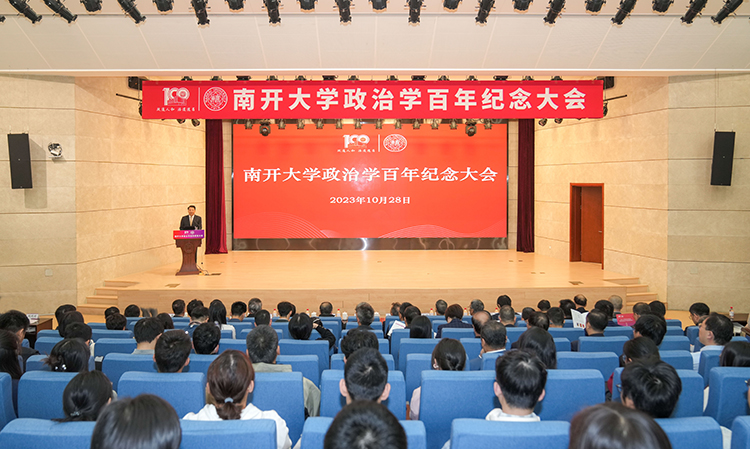
On October 28, the Centenary of Nankai University’s Political Science Discipline was held at the lecture hall on Jinnan Campus.
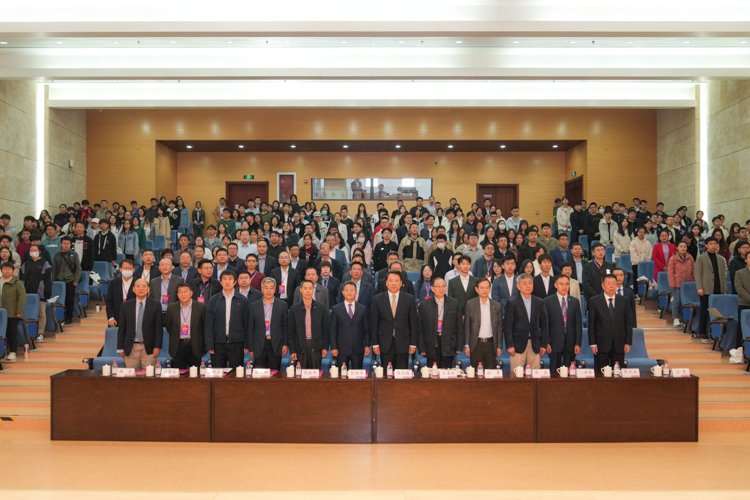
The centenary was attended by more than 300 people, including Chen Yulu, Deputy Director of the Financial and Economic Committee of the National People’s Congress and President of Nankai University; Wang Puqu, Convener of the Political Science Discipline Evaluation Group of the Academic Degrees Committee of the State Council and Boya Chair Professor of Peking University; Zhang Shuhua, Executive Vice President of the Chinese Political Science Association and an alumnus of Nankai University; Xu Yong, a senior professor at and Director of the Department of Political Science of Central China Normal University; Chen Zhenming, Director of the Department of Social Sciences and Dean of the Public Policy Research Institute of Xiamen University; Chen Yue, Dean of the Institute for National Security Studies of Renmin University of China; Su Changhe, Dean of the School of International Relations and Public Affairs of Fudan University; Men Honghua, Dean of the School of Political Science and International Relations of Tongji University; Tong Dezhi, Vice President of Tianjin Normal University; Yang Xuedong, Dean of the Department of Political Science of Tsinghua University and an alumnus of Nankai University; Zhu Guanglei, former Vice President of and a chair professor at Nankai University, and the first Dean of Zhou Enlai School of Government; Yang Long, former executive vice dean of Zhou Enlai School of Government, as well as representatives of political science alumni of Nankai University, heads of departments of sister universities, and representative faculty and students of Zhou Enlai School of Government. The conference was presided over by Wang Hui, Chair of Zhou Enlai School of Government.
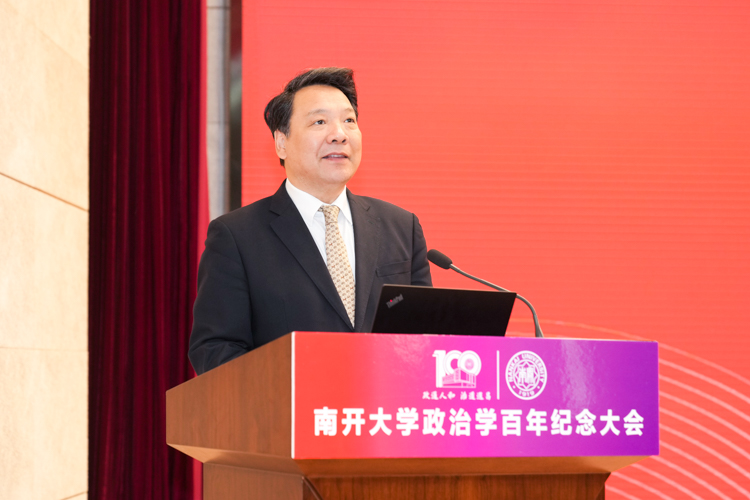
On behalf of NKU, Chen Yulu extended a warm welcome to the guests and expressed heartfelt thanks to the faculty, students, alumni and personages from all circles who have been concerned about and supported Nankai University’s political science program and the university development. He said that over the past century, Nankai University’s political science discipline has followed the academic tenet of “knowing and serving China”, and promoted theoretical research and academic innovations in response to the needs of the country, making historical contributions to the progress of China’s political science. When the Department of Political Science was established a hundred years ago, it attracted many well-known masters such as Xu Mo, Xiao Gongquan, and Luo Longji in a short time, leading the development of China’s political science. After the founding of the People’s Republic of China, particularly since the reform and opening up, Nankai University’s political scientists answered the call of the state by making explorations and blazing a trail in discipline development, and advanced a series of new theories and concepts such as “process of Chinese government” and “politics of development”, which played a key role in promoting the development and reconstruction of political science in China. In the new era, Nankai University’s political science discipline strives to facilitate academic innovation and improve the ability to advise and aid the administration of government in response to major national strategies and the needs of economic and social development, making great contribution to the establishment of the political science discipline system, academic system and discourse system with Chinese characteristics.
Chen Yulu stressed that political science is an important discipline underpinning the “Chinese modernization” discipline group at Nankai University. The university will, as always, fully support the development of political science discipline. At a new starting point of the centenary, Nankai University’s political science discipline should hold fast to the fundamental position of Marxism, follow President Xi Jinping’s expositions on philosophy and social sciences, uphold the academic mission of “good government, solidarity of the people, and correct path of governance for lasting prosperity”, while grounding the work in China. We should leverage Nankai University’s characteristics to produce original, leading, landmark academic achievement faster, independently cultivate new talents who are equal to the task of national rejuvenation, and strive to provide strong theoretical and practical support for the establishment of China’s independent knowledge system, thereby contributing to the building of a great modern socialist country in all respects.
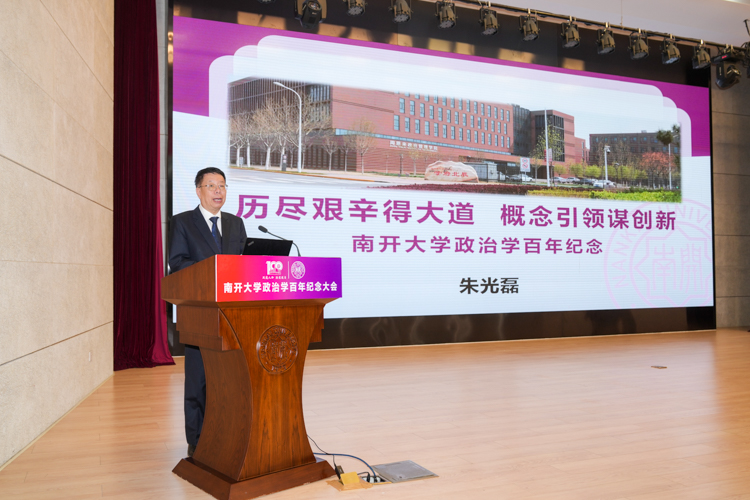
Zhu Guanglei reviewed the centennial development of Nankai University’s political science discipline.
Nankai University’s political science discipline is a time-honored discipline with profound heritage. Nankai University ran a course of political science when it was established in 1919. The Department of Political Science was established in 1923. During the War of Resistance against Japanese Aggression, Nankai University, Tsinghua University, and Peking University merged to form the National Southwest Associated University (NSAU), and the political science departments of the three universities were merged and operated under the Law and Business School of the NSAU. After Nankai University resumed its operation in 1946, the Department of Political Science, the Department of Economics, etc. were merged and renamed the School of Political Science and Economics. At the beginning of establishment, Nankai University’s political science discipline gathered a large number of well-known scholars including Xu Mo, Xiao Gongquan, Luo Longji, Mei Ruao, Wang Ganyu, Chen Xujing, Yang Jingnian, and Bao Juemin, cultivated many outstanding students such as Cao Yu and Zha Liangjian, and produced a wealth of influential academic works, making key contributions to the early development of China’s political science.
In early 1949, the Department of Political Science was cancelled. In the subsequent 30 years, Nankai University’s political scientists continued to engage in teaching and study in Marxist theory of the state, comparative political institutions, political geography, history of Chinese political thought, and history of international relations under the Department of History, Department of Philosophy, Marxist-Leninist Teaching and Research Office, and Institute of Economics. After 1979, the Department of Political Science gradually resumed its operation under the leadership of Wang Ganyu, Zheng Jianmin, Zhang Lingzhi, Niu Xingxi, Che Mingzhou, et al. Since 1986, the Department of Political Science began to handpick and train faculty and map out the directions of academic research. With a large number of young scholars rapidly emerged, it realized the possession of doctoral students and monographs in an early stage, which laid a good foundation for Nankai University’s status in the academic circles and the rapid subsequent development. At the turn of the century, Nankai University saw a period of rapid development in political science and administrative science in the context of the flourishing applied social sciences. In 1998, a substantial College of Law and Political Science was established. In 2004, the Zhou Enlai School of Government was established. After nearly 40 years of hard work, Nankai University has its own characteristics for the major and discipline construction of political science and administration science. Nankai University’s political science discipline ranked fifth in the country in discipline evaluation in 2004, 2008 and 2012, and it was rated “A-” in 2016. It made new progress in the fifth round of discipline evaluation.
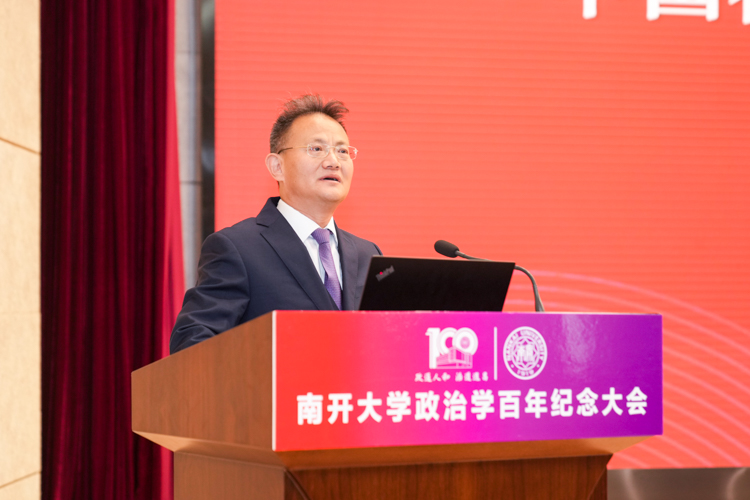
On behalf of the Chinese Political Science Association, the Institute of Political Science of the Chinese Academy of Social Sciences, and the School of Government of the
University of Chinese Academy of Social Sciences (UCASS), Zhang Shuhua offered warm congratulations on the centenary of Nankai University’s political science discipline. He said that Nankai University’s political science discipline is a key center for the study and teaching of political science in China, and it is a brilliant ambassador for China’s political science circles. China has entered a critical period in the establishment of independent knowledge system of political science. It is hoped that political scientists will earnestly follow President Xi Jinping’s expositions on philosophy and social sciences, work together and innovate to promote self-reliance, independence, and self-improvement for China’s political science in the new era.
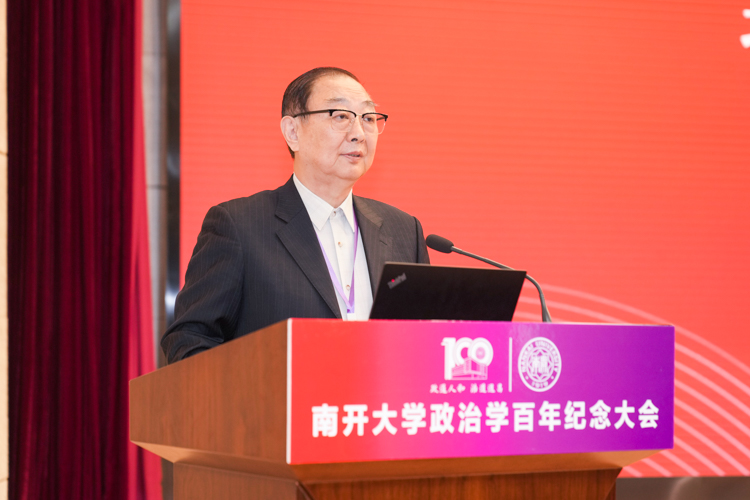
Wang Puqu read out a congratulatory letter from the Political Science Discipline Evaluation Group of the Academic Degrees Committee of the State Council and the Teaching Steering Committee of Political Science Majors of the Ministry of Education. The letter read that over the past 100 years, Nankai University’s political scientists have fulfilled the responsibility of “knowing and serving China”, produced new talents, made outstanding achievements in the primary research areas of political science, and developed its distinctive characteristics for the study of Chinese government and politics, making key contributions to the establishment of the political science discipline system, academic system and discourse system with Chinese characteristics. In the new era and new journey, it is hoped that Nankai University’s political science discipline continue to integrate discipline construction, academic study and talent cultivation with Chinese modernization, and make greater contributions to the building of a modern socialist country in all respects.
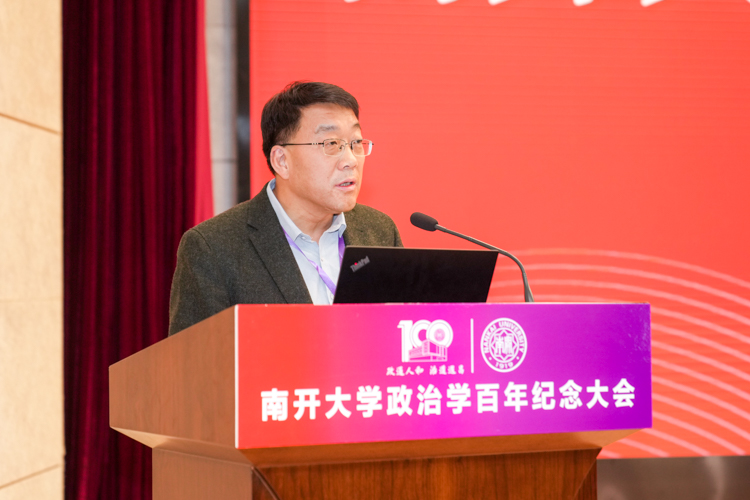
As the alumni representative, Yang Xuedong recalled his unforgettable school days at Nankai University, and expressed thanks to the alma mater for training, and to political science senior faculty for academic guidance and support.
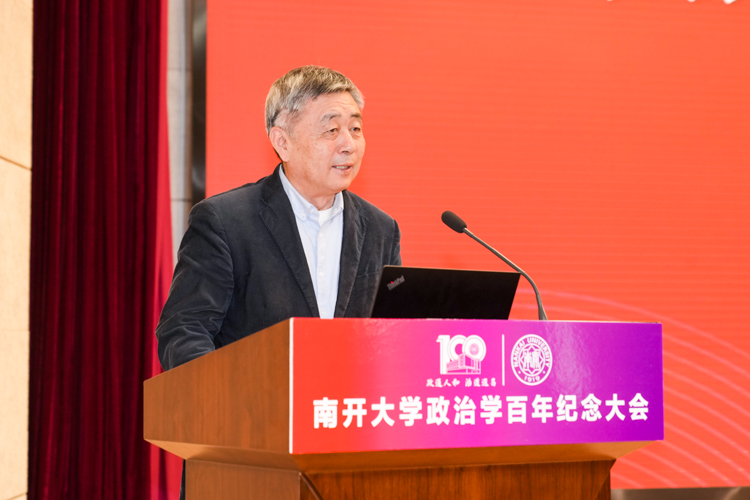
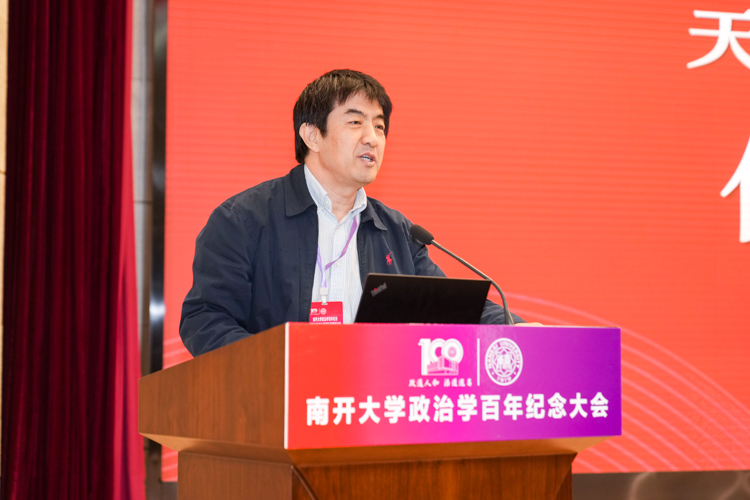
Chen Yue and Tong Dezhi, as representatives of the departments of sister universities, congratulated the centenary of Nankai University’s political science discipline. They said that the world today is undergoing momentous changes of a scale unseen in a century, and the whole country is working together to build a modern socialist country in all respects, which offers a major opportunity for the development of political science. It is hoped that Nankai University’s political science scholars will deepen exchanges and cooperation with their counterparts at sister universities to better contribute to the development of political science in China.
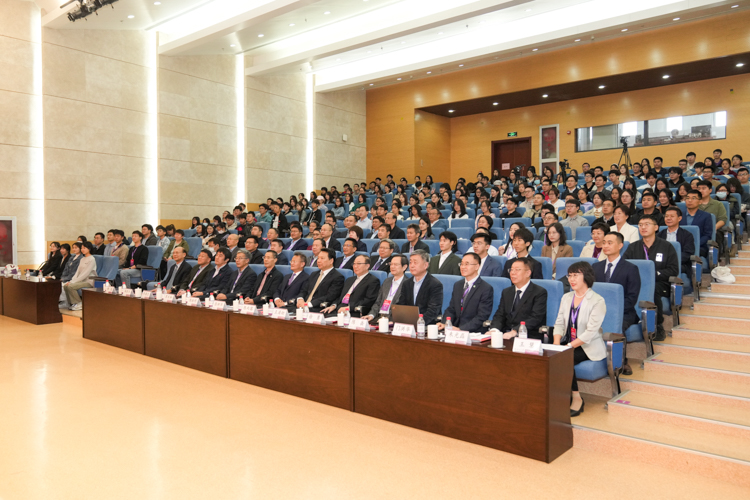
The Seminar on the Development of Political Science in the New Era was held on the same day. Xu Yong, Chen Zhenming, Su Changhe, and Men Honghua made keynote speeches at the seminar.
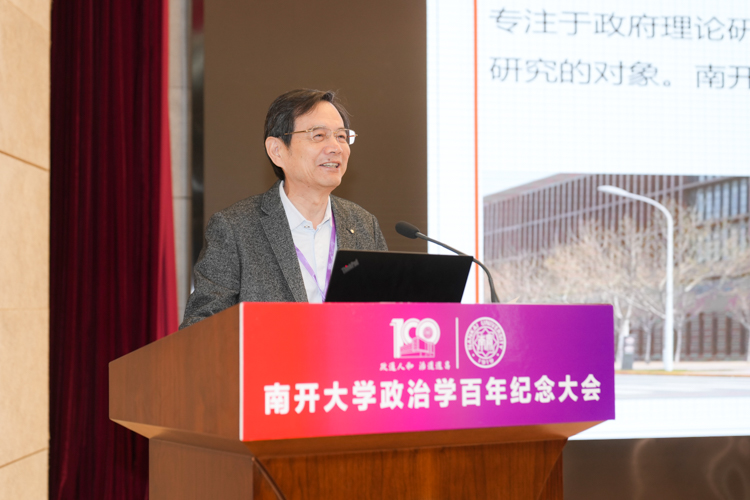
Xu Yong delivered a speech entitled “‘Responsibility Order Construction’ and the Establishment of an Independent Knowledge System of Political Science”, in which he reviewed the outstanding contributions of Nankai University’s political science discipline to the establishment of an independent knowledge system of China’s political science. He said that it is necessary to examine China from the perspectives of history and reality in promoting the building of independent knowledge system of China’s political science, and to enter the government and explore independent knowledge that meet realistic needs and serve the future.
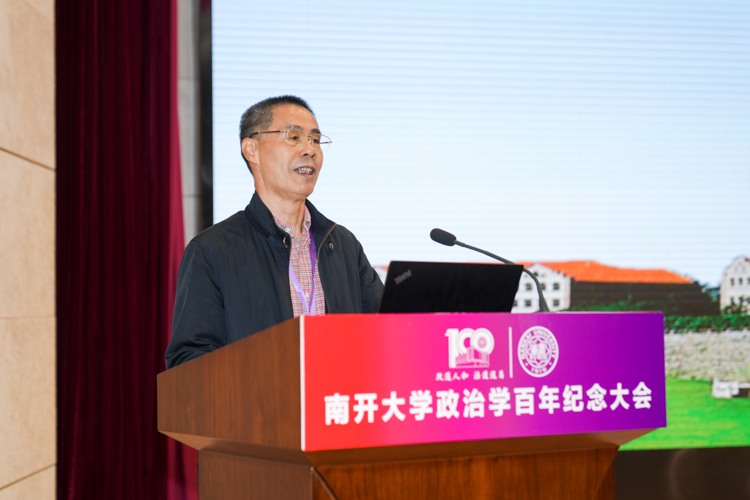
Chen Zhenming made a report entitled “View the Establishment of China’s Independent Knowledge System of Public Governance from the Perspective of Scientific Methodology”, in which he analyzed the relationship between the discipline of public administration and the discipline of political science, and recognized the parent status of political science. He said that China’s independent knowledge system for public administration must be established from multiple perspectives such as reality, history and the world. Based on the tradition, we should bear in mind China’s reality and promote theoretical innovation, providing strong talent and knowledge support for Chinese modernization.
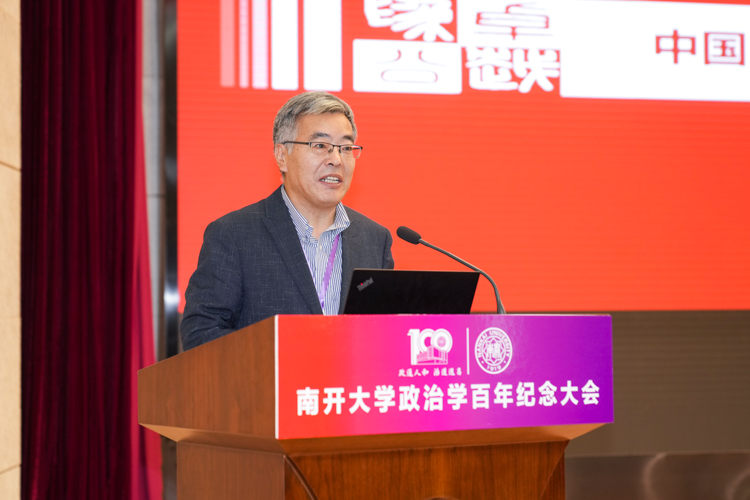
In the keynote speech entitled “Conceptual Consciousness in the Establishment of China’s Independent Knowledge System for Political Science”, Su Changhe stressed the importance and basic meaning of the disciplinary knowledge system. He said that political scientists in the new era should have the awareness of developing a symbolic concept, thereby promoting the all-round progress of China’s political science.
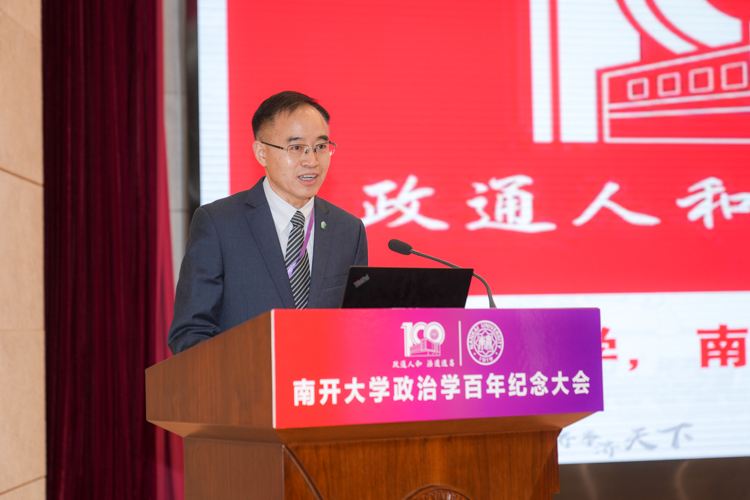
Men Honghua gave a report entitled “The Development of China’s International Relations Discipline – Opportunities, Challenges and Prospects”. He said that as the linkage between China and the world increases, the discipline of international relations ushers in a “new era”, and also faces a raft of challenges. It is necessary to have a sense of innovation and promote the establishment of the academic system; keep discipline construction independent and properly handle the relations between the past or present, and between China and the world; promote the interdisciplinary development of international relations studies; and take a problem-oriented approach to achieve continuous progress in theory and discipline.
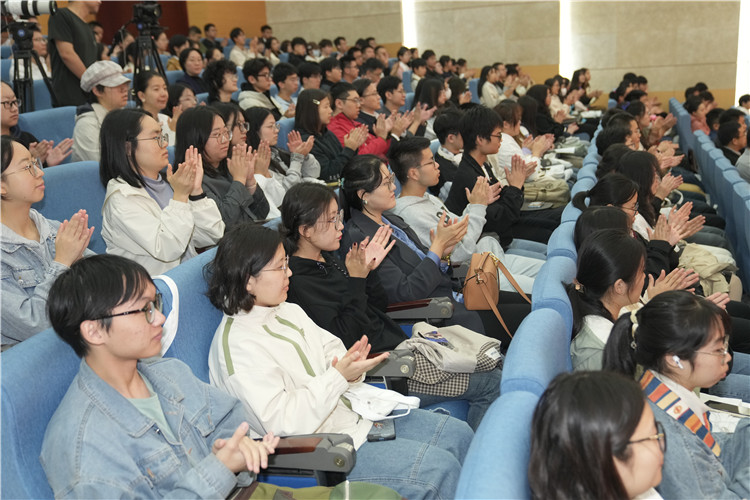
On the afternoon of the same day, experts and scholars from well-known universities and research institutes in China conducted in-depth discussion on “Development of Political Science in the New Era”.
(Edited and translated by Nankai News Team.)









